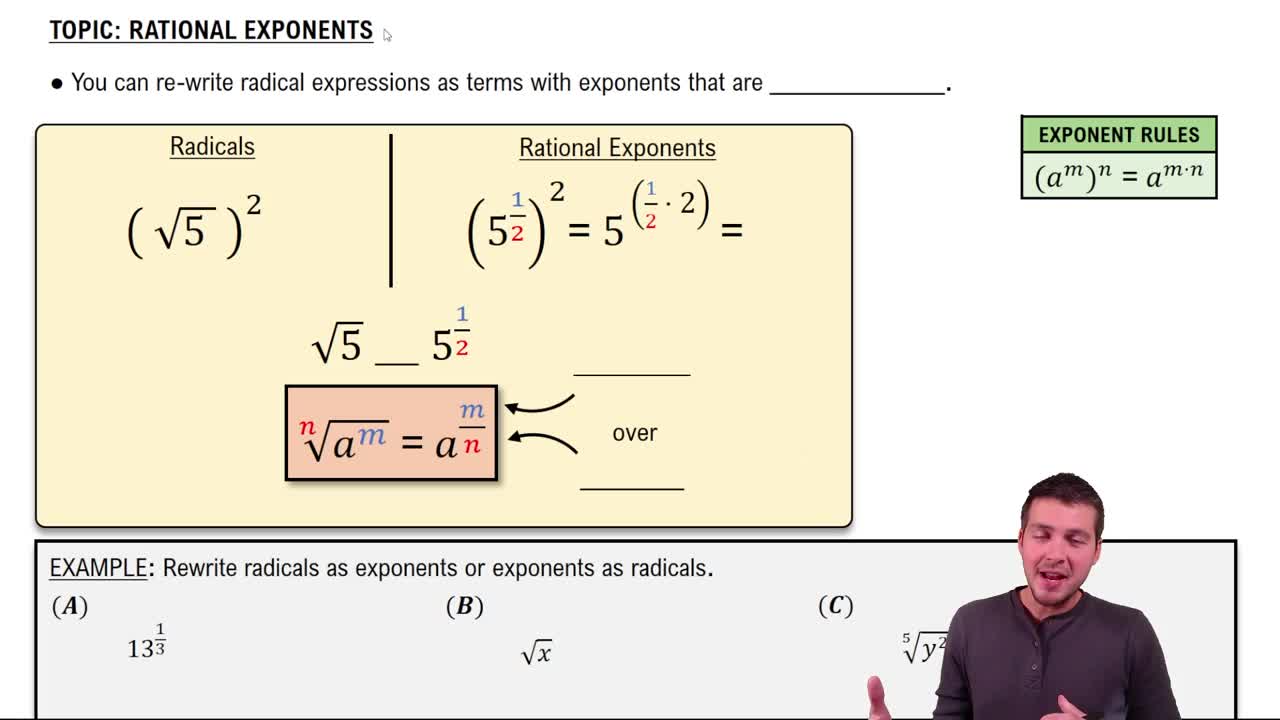Table of contents
- 0. Review of Algebra4h 16m
- 1. Equations & Inequalities3h 18m
- 2. Graphs of Equations43m
- 3. Functions2h 17m
- 4. Polynomial Functions1h 44m
- 5. Rational Functions1h 23m
- 6. Exponential & Logarithmic Functions2h 28m
- 7. Systems of Equations & Matrices4h 6m
- 8. Conic Sections2h 23m
- 9. Sequences, Series, & Induction1h 19m
- 10. Combinatorics & Probability1h 45m
0. Review of Algebra
Radical Expressions
Problem 25a
Textbook Question
In Exercises 25–34, use the zero-exponent rule to simplify each expression. 6⁰
 Verified step by step guidance
Verified step by step guidance1
Identify the zero-exponent rule, which states that any non-zero number raised to the power of zero is equal to 1.
Recognize that the base in the expression is 6, which is a non-zero number.
Apply the zero-exponent rule to the expression 6^0.
Simplify the expression using the rule: 6^0 = 1.
Conclude that the simplified form of the expression is 1.
Recommended similar problem, with video answer:
 Verified Solution
Verified SolutionThis video solution was recommended by our tutors as helpful for the problem above
Video duration:
1mPlay a video:
Was this helpful?
Key Concepts
Here are the essential concepts you must grasp in order to answer the question correctly.
Zero Exponent Rule
The zero exponent rule states that any non-zero base raised to the power of zero equals one. This rule is fundamental in algebra as it simplifies expressions and helps in solving equations. For example, 6⁰ simplifies to 1, regardless of the base, as long as the base is not zero.
Recommended video:
Guided course

Introduction to Exponent Rules
Exponential Notation
Exponential notation is a way to express repeated multiplication of a number by itself. It consists of a base and an exponent, where the exponent indicates how many times the base is multiplied. Understanding this notation is crucial for applying rules like the zero exponent rule effectively.
Recommended video:

Exponential Functions
Properties of Exponents
Properties of exponents are a set of rules that govern how to manipulate expressions involving exponents. These include rules for multiplication, division, and powers of powers. Familiarity with these properties allows for the simplification of complex expressions and is essential for solving algebraic problems.
Recommended video:
Guided course

Rational Exponents
Related Videos
Related Practice













